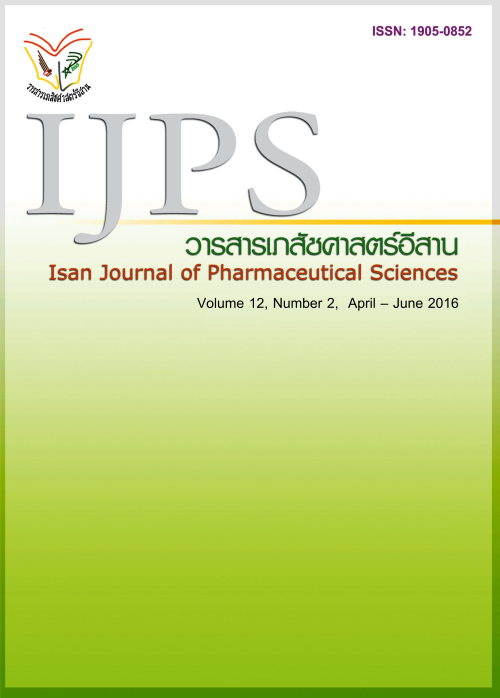Increasing Drug Adherence by Using Multimedia and Pharmaceutical Care for Patients with Major Depressive Disorder
Main Article Content
Abstract
Introduction: This study aim to evaluate the effects of multimedia with pharmaceutical care to promote adherence for patients with depressive disorders. Method: The design of this study was a randomized controlled trial. Outpatients with major depressive disorder were recruited. Sixty-eight patients were randomized to the experimental group which were assigned to watch multimedia related cause of depressive disorder, principle of treatment, adverse drug reaction management combine with pharmaceutical care (33 cases) and the control group which were received usual care (35 cases). Result: The participants of the study were not significantly different in characteristics except alcohol consumption is greater number in experimental than control group while exercise in experimental group is less than control group. However, these two factors are not effect to adherence. Baseline of adherence, drugs related problems (adverse drug reaction and drug interaction), knowledge and understanding of disease and medication were not different between experimental and control group. After 1 month of the study, the results showed that the experimental group (0.9 ± 1.40 points) had scores on adherence significantly better than control group (2.2 ± 1.71 points) (p <0.001). Adverse drug reactions happened in experimental group (7 patients, 21.2 percent) significantly less than control group (17 patients, 48.6 percent) (p = 0.023). Drug interaction appeared non-different between two group (p=0.230). Knowledge scores in experimental group (9.2±2.18 points) significantly more than control group (7.7±2.30 points) (p=0.007). Patients in experimental group had 9Q scores reduce from 4.2±7.26 to 1.7±4.21points. The multimedia satisfaction score was 89.1%. Conclusion: Using multimedia with pharmaceutical care is effective choice to promote adherence and solve drug related problems.
Article Details
In the case that some parts are used by others The author must Confirm that obtaining permission to use some of the original authors. And must attach evidence That the permission has been included
References
Adler DA, Bungay KM, Wilson IB, et al. The impact of a pharmacist intervention on 6-monthout-comes in depressed primary care patients. Gen Hosp Psychiatry. 2004; 26(3): 199–209.
Akiskal HS. Dysthymia cyclothymia and related chronic sub-threshold mood disorders. New Oxford Textbook of Psychiatry. London: Oxford University Press; 2000: 736-49.
Brook OH, Hout H, Stalman W, et al. A pharmacy-based coaching program to improve adherence to antidepressant treatment among primary care patients. Psychiatr Serv. 2005; 56(4): 487–89.
Brown C, Battista DR, Sereika SM, Bruehlman RD, Burke BL, Arkowitz H, MencholaM. The efficacy of motivational interviewing: a meta- analysis of controlled clinical trials. J Consult Clin Psychol. 2003; 71: 843-61.
Capoccia KL, Boudreau DM, Blough DK, et al. Randomized trial of pharmacist interventions to improve depression care and outcomes in primary care. Am J Health-Syst Pharm. 2004; 1(4): 364-72.
Finley PR. Impact of a collaborative pharmacy practice model on the treatment of Depression in Primary care. Pharmacotherapy 2003; 23: 1175-85.
Gabriel A, Violato C.Knowledge of and attitudes towards depression and adherence to treatment: The antidepressant adherence scale (AAS). Journal of affective disorders. 2010; 126: 388–94.
Lin EH, Von KM, Katon W.The role of the primary care physician in patients’ adherence to antidepressant therapy. Med Care. 1995; 33: 67–74.
Rebetez C, Betrancourt M, Sangin M, Dillenbourg P.Learning from animation enabled by collaboration.
Instructional Science 2009; 5(38): 471-85.
Ruiz J, Cook D, Levinson A.Computer animations in medical education: a critically treasure review. Medical education 2009; 43: 838-46.
Sajatovic M. Psycho educational approaches to medication adherence in patient with bipolar disorder. DisManag Health 2007; 15: 181-92.
Seedat S, Haskis A, Stein J. Benefits of consumer psycho education: a pilot program in south Africa. University of Stellenbosch, South Africa. 2008; 38(1): 31.
Simon GE, Ludman EJ, Operskalski BH. Randomized trial of a telephone care management program for outpatients starting antidepressant treatment. Psychiatric services 2006; 57(10): 1441- 45.
Sirey JA, Bruce ML, Kales HC. Improving Antidepressant adherence and depression out comes in primary care: The treatment initiation and participation program. Am J Geriatr Psychiatry. 2010; 18(6): 554-62.
World Health Organization. Adherence to long-term therapies. Evidence for action. WHO Library Cataloguin-in-Publication Data. Switzerland. 2003.
Zhou X., Qin B., Del Giovane C., Pan J., Gentile S., Liu Y. et al. Efficacy and tolerability of antidepressants in the treatment of adolescents and young adults with depression and substance use disorders: a systematic review and meta-analysis. Society for the Study of Addiction. 2015; 110: 38–48.


